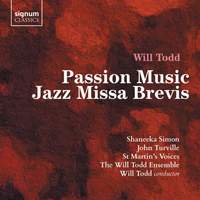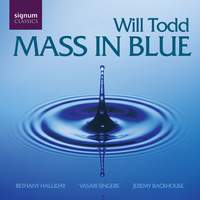Interview,
Will Todd on his Jazz Missa Brevis
 British composer Will Todd shot to fame in the early 2000s with Mass in Blue, an innovative work which - as the name suggests - blended jazz and blues elements with a more traditional choral idiom. It was an instant hit with choirs and audiences alike, and has been performed regularly ever since.
Since then, Todd has composed works in a variety of styles, releasing two albums of what might be called "mainstream" choral music with acclaimed choir Tenebrae - but until now, he hadn't revisited that unique choral-jazz style. I asked Will about the factors that drew him back to the sound-world of Mass in Blue, and about his creative process.
British composer Will Todd shot to fame in the early 2000s with Mass in Blue, an innovative work which - as the name suggests - blended jazz and blues elements with a more traditional choral idiom. It was an instant hit with choirs and audiences alike, and has been performed regularly ever since.
Since then, Todd has composed works in a variety of styles, releasing two albums of what might be called "mainstream" choral music with acclaimed choir Tenebrae - but until now, he hadn't revisited that unique choral-jazz style. I asked Will about the factors that drew him back to the sound-world of Mass in Blue, and about his creative process.
Since you composed your Mass in Blue, a number of other composers have experimented with fusing jazz and sacred choral music – notably Bob Chilcott with two jazz Masses of his own. Do you see yourself as the founder of a new sub-genre of music?
I’m not sure. I exist in a tradition, but that tradition goes back into the blues and gospel era. If you look back at the late period of Duke Ellington in the ‘60s – towards the end of his life he became more concerned with matters of spirituality and religion – he did a series of what he called Sacred Concerts, very large works in which he blended his big-band sound and a choral sound, in a fusion of gospel and praise music. I’ve always been very aware of that music (interestingly, there have only been a few sporadic recordings of it), and what I mean by that is that there’s always this fusion of styles going on in music, which is a good thing and one of the great powers that music has, as well as being how we make progress.
The thing about me as a musician, in terms of my own formation and how I came to music, is that I started life as an improviser, teaching myself to play the piano. I’m first and foremost an improvising pianist, and all my notation and more “classical” training sits on top of that, and is of course very useful. It’s actually quite a natural fit for me to use improvised music and choral music, because the other strand for me growing up was singing in choirs.
So in a rather roundabout answer to the question: In one sense it’s not “my baby” in that people have fused these elements before, but in another sense it is, because these are strands that are very integral to my DNA as a musician – on the one side the blues, improvised element, and on the other side the choral, religious style. There are plenty of pieces of mine which don’t use jazz – more straightforward choral works. For me, it’s about fusing the two styles.
Given the huge and ongoing success of Mass in Blue, what has led you to revisit the “jazz mass” concept over 15 years on?
Interestingly, after I wrote Mass in Blue and it became so successful – which is great, as any artist is always happy with success! – I think I thought to myself that now I had to do everything differently from Mass in Blue and avoid that sound. This is a problem that artists can face and it’s sometimes to do with how strongly we emphasise to artists that there’s always value in exploring and changing. Which there is, of course! But if you look at any well-established artist in any era, you would say that they have a certain sound and we recognise it as, say, an opera by Puccini. That isn’t to say that early Puccini is the same as late, but there’s a thread linking them that you can sense.
I think enough time had elapsed since Mass in Blue for me to realise that I really did love that sound-world, the blues-y, gospel-y style that at the same time is choral music. It is my world and I’m allowed to revisit it! It was more a case of allowing myself to revisit this style. Interestingly enough, in both cases - Mass in Blue and the Passion Music - the composition time itself was very short, which I think is often a sign when you’re writing that you’re in your correct vein. The music flows out and is relatively easy to write.
Do you anticipate any of your jazz-infused works being used in a liturgical setting, or are they intended first and foremost as concert works?
Both works received their first performances as concert works, and Mass in Blue is frequently done this way, but having said that I’ve done several liturgical performances of Mass in Blue over the years. It was broadcast on Radio 4 some years ago and I’ve done it in several cathedral settings. The thing about Mass in Blue is that it wasn’t written with liturgical use in mind, in terms of the length of the movements – it’s 37 or 38 minutes of music, which is a lot to have in a service. I wrote a shorter jazz mass which is on this album alongside Passion Music - the Jazz Missa Brevis - which was written specifically for liturgical use and was commissioned by Portsmouth Cathedral for that purpose. That’s why it’s more compact and doesn’t feature a creed, which generally isn’t sung in modern liturgy.
When it comes to Passion Music, again, I was conscious of wanting to create a piece that can work in a concert setting, if you perform all nine movements in a row, but I was also mindful that it would be interesting to use this music in liturgical way, either by interspersing it with readings from the Good Friday Liturgy, for example, or indeed other texts might be used. I’ve elected not to stipulate what those might be, because I think that can hem things in and I quite in worship situations the idea that someone creating the worship will bring in their ideas as to what these texts might be. I hope in the fulness of time that we’ll get to do Passion Music in a liturgical context.
For some of the non-mass settings that make up the other half of this album, in Passion Music and as standalone works, you’re the lyricist as well as the composer. How do you find this facet of the creative process relates to the musical aspect?
Thinking back to my early music-making, I started with improvising and very quickly moved into song-writing. In my teens I wrote a lot of songs, some of them more pop-song-oriented, some of them more religious in feel. In that method of working, I worked at the piano and developed the lyrics at the same time, with the two things going in parallel. When I entered my 20s I became terribly self-conscious, as one often does – I think it’s one of the great gifts that teenagers have, that in some ways they’re less self-conscious. Of course, they’re very conscious of emotion but less self-conscious about being creative. Then you get that period when you’ve had lots of teaching and worry all the time about what you’re creating, and I think after that maybe you have to re-learn how to be less self-conscious.
There was a breakthrough point for me when I wrote a piece called My Lord has come, which is a Christmas carol, and I went back to using my own words in that piece, which I wrote in 2011. And it was instantly very successful; people seemed to love it both as a piece of music but also for the lyrics that were in there. I’ve set lots of other writers’ words to music, and I’ve worked with writers, which I love doing because they give you ideas that you would never have yourself. But I think there is still that part of me that is still a songwriter, so it’s quite natural for me to have these sections – sometimes when I can’t necessarily find the text that I want, I just think “I know what I need” and I’ve got the confidence to create the text. They’re often quite simple “word-worlds”, if you like, but I know what they’ve got to do with the music. So I think it’s the songwriter part of me that allows me to do that, and I’m doing more of it as time goes on.
You’ve notched up a number of compositions in recent years – a clarinet concerto, Requiem and Te Deum as well as smaller works. Can you tell us anything about what you’re working on next?
I can – it’s certainly not a secret! You may know that I wrote an opera, Alice’s Adventures in Wonderland, which we did with Opera Holland Park. It’s been very successful both for them and me. I’m now writing a big piece for Welsh National Opera which they’re putting on in 2020, called Migrations, and it is a highly topical piece about people migrating – a series of interwoven stories, some current and some older, about migration. As you can imagine, there’s quite a lot of pain in those stories. It’s an exciting project – a two-act opera for the full company, and they’ll be touring it in the autumn of 2020. Another opera in the works, also for 2020, is one I’m doing for Opera North which will be happening in the summer – a single-act opera. So in essence, at the moment what I’m writing is lots of opera!
Another influence on me growing up was in fact opera – alongside the improvising and the church music. My mother and father had very broad musical tastes but if you had to nail them down to one thing they really loved listening to, it was opera. We had records of opera playing a lot in our house when I was young, so I have a great love of the art-form, even though it’s a very challenging one in all sorts of ways – acoustically and so forth, and the stagecraft is very complex. But I relish that, I love trying to solve the scene, how to get the music to convey the scene and amplify it. All these big projects that are going to take up the next eighteen months of my life are very enjoyable.
So far I’ve finished the draft of Act I of the WNO piece, which my collaborators seem pretty happy with, and I’m ploughing into Act II as we speak!
Will Todd: Passion Music & Jazz Missa Brevis
Shaneeka Simon (vocals) & John Turville (piano), St Martin’s Voices & Will Todd Ensemble, Will Todd
Will Todd: Passion Music & Jazz Missa Brevis is released on Signum on 1st February.
Available Formats: CD, MP3, FLAC, Hi-Res FLAC
"Todd clearly loves and understands jazz" – Gramophone
Available Formats: CD, MP3, FLAC




